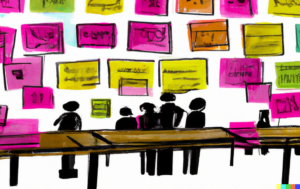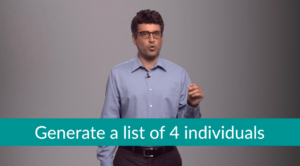Interview: Chip Kimball, Superintendent, Lake Washington
 Can you describe the transition from your background to Superintendent? Are you still engaged in CIO duties in your superintendent role?
Can you describe the transition from your background to Superintendent? Are you still engaged in CIO duties in your superintendent role?
Most successful Superintendents come from a diverse background. In my case, I was a high school science teacher who became quickly adept at technology, and started integrating technology into my classroom very early as personal computers were arriving on the scene. I was asked to help provide professional development and systems support for my school and school district in California. This led to a variety of opportunities including working for the state department of education, consulting, and a tremendous opportunity as the CIO for Lake Washington, home of Microsoft.
Today my primary job responsibility as it relates to the CIO role is to develop and drive the vision and strategic technology objectives for the system, as well making sure that the technology team has the systems and resources to execute.
Today the tech strategy is managed by a very competent technology team led by a district CIO.
What’s the toughest part of the job?
Developing a deep understanding of teaching practice, and developing powerful relationships inside of the school system and the community. While many successful CIOs know how to do this, and do it well, it comes less naturally as a part of the CIO job. This is where specific experience supervising schools and programs helped tremendously. In some respects, over a period of 3 years, I had to reinvent myself inside of the Lake Washington organization as I transitioned from CIO to superintendent.
How does being a CIO inform your decisions on a district level? What’s the most important for you in your job?
There are a number of experiences. The work has helped me in understanding how to develop vision, strategy, develop systems of support, and how to bring an initiative to scale. Most important is an understanding of how technology does/can impact classroom teaching, and the powerful use of data in the classroom and in the system.
Does being a CIO give you a different perspective from other superintendents? Where do you see the divergence?
There are a number of very effective superintendents who understand the positive impacts of technology, who can develop and drive the vision, and are strategic in their systems and implementation.
Most every successful CIO has a strong superintendent supporting their work. There are, however, also many superintendents who delegate their responsibility as the keeper of the vision, and the understanding of systems required to execute that vision.
The one place where there is definitely a divergence with most other superintendents is that I have a deeper understanding of the very jargon-oriented language that technologists use, and have a deep understanding of how many of the systems work. This gives me the ability to ask deeper and more technical questions, and can sometimes flush out when big promises are being made that aren’t likely possible.
What should every school be capable of achieving in your district?
Every school should be capable of ensuring that every student has a meaningful, relevant, and challenging learning experience, no matter what their previous experience and background.
With a clean slate, what would school look like if you had access to the tools and the resources to create a school ready for this century?
The most important part of creating a school for the future is about building a team that clearly understands the vision, understands students, and has the tools to create relevant and engaging learning experiences for students.
The school of the future is most of all flexible, information rich, technology enabled, and student friendly. Schools must adapt to the changing landscape of our culture, and must help student engage in a global economy. This needs to include an environment where students can get broad expertise in and outside the school building, and well as practical hands-on experiences. This also needs to be an environment where students can use tools that they have at home as a part of their school day.
Where does data play in the push for education reform?
Without it, there is no hope of reform, period. We must be able to understand the gaps in students learning, and create proactive and immediate interventions for students. We must understand our teaching staff capability and how they impact student achievement, and provide the supports for staff to use their strengths most effectively.
One of the tragedies in public education is the broad generalizations we use to label and sort students based upon a inadequate picture of their skills. With well developed and thoughtfully utilized data systems, we will be able to break down old assumptions, and archaic practices around the performance of students and the interventions required to improve that performance.
What learning tools should we have that we don’t?
First and foremost, we need better data systems. These systems must create an easy way to both collect data and analyze data. One of the current limitations with our current data initiatives is that data collection is too often relegated to data entry by the teacher, or online assessments that are primitive in their design and intelligence.
Data is difficult to interpret and use. We need technology tools that are a natural part of the learning experience for students that contribute to the constant collection and analysis of data so that teachers can effectively design personal instruction.
Any benefit to being in the Microsoft school district?
Most school districts are able to reflect the character of their community. No, we do not receive millions of dollars from Microsoft as a result of being in Redmond. And from a state and local funding perspective, we are in the bottom quartile of the state.
We do, however, have access to tremendous intellectual capital in our community, and in our schools, as a result of their presence.







0 Comments
Leave a Comment
Your email address will not be published. All fields are required.